TERMITES
ences between the termite castes are probably innate, and that they arise from differences in the constitutional elements of the germ cells that direct the subsequent development of the embryos in the eggs and of the young after hatching.
Still, however, there remain questions as to the nature of the force that controls termite behavior. Why do the termites remain together in a community instead of scattering, each to live its own life as do most other insects? Why do the workers accept their lot and perform all the menial duties assigned to them? Why do the soldiers expose themselves to danger as defenders of the nests? Structure can account for the things it is impossible for an animal to do, but if can not explain positive behavior where seemingly the animal makes a choice between many lines of possible action open to it.
In the community of the cells that make up the body of an animal, as we learned in Chapter IV, organization and control are brought about either through the nerves, which transmit an activating or inhibiting force to each cell from a central controlling station, or through chemical substances thrown into the blood. In the insect community, however, there is nothing corresponding to either of these regulating influences; nor is there a law-making individual or group of individuals as in human societies, nor a police force to execute the orders if any were issued. If would seem that there must be some inscrutable power that maintains law and order in the termite galleries. Are we, then, to admit that there is a "spirit of the nest," an "âme collective," as Maeterlinck would have us believe—some pervading force that unites the individuals and guides the destinies of the colony as a whole? No, scientists can not accept any such idea as that, because it assumes that nature's resources are no greater than those of man's imagination. Nature is always natural, and her ways and means of accomplishing anything, when once discovered, never invoke things
[143]
